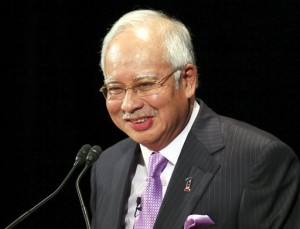
Malaysian Prime Minister Najib Razak delivers a keynote speech at the 20th International Conference on The Future of Asia in Tokyo, Thursday, May 22, 2014. Najib Razak has distanced himself from escalating maritime disputes in Asia, telling a Japanese newspaper that the territorial conflicts should not jeopardize the “strategic importance” of his country’s ties with China. AP PHOTO/KOJI SASAHARA
TOKYO—Malaysian Prime Minister Najib Razak has distanced himself from escalating maritime disputes in Asia, telling a Japanese newspaper that the territorial conflicts should not jeopardize the “strategic importance” of his country’s ties with China.
“We must look at the big picture and not define relations with China on a single-issue basis, but look at the broad spectrum of the relations and recognize the strategic importance of our bilateral relationship with China,” Najib told Japan’s Nikkei daily on Thursday.
“We do not want [the territorial] issue to be an impediment to the growing ties between Malaysia and China,” the Malaysian premier, who is on a visit to Japan, said in an interview with the business daily.
Najib’s comments came as Vietnam and the Philippines—which along with Malaysia are members of the Association of Southeast Asian Nations—are embroiled in separate rows with China over control of parts of the South China Sea.
Tensions remain high in the region after an eruption of deadly anti-China riots in Vietnam over Beijing’s controversial plans to drill for oil in contested waters.
Kuala Lumpur and Beijing have their own rival claims to parts of the South China Sea—believed to hold vast deposits of oil and gas—but Najib has played these down as he pursues closer ties with Malaysia’s top trading partner.
Najib’s government has also been trying to placate Chinese anger over the disappearance of Malaysia Airlines Flight 370, two-thirds of whose 227 passengers were from China.
On Thursday, Najib said: “We should heed the fundamental principles in which good diplomacy is a conductor… [of] sovereign equality, respect for territorial integrity, peaceful settlement of disputes and mutual benefits in relations.”
He added that disputes over resources should be solved through “international law and not economic and military solutions.”


